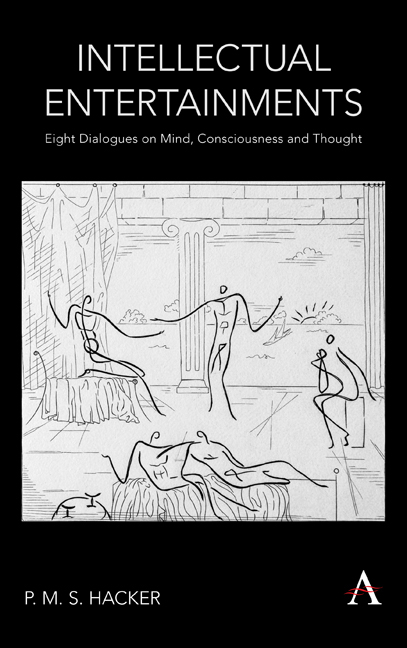Book contents
- Frontmatter
- Dedication
- Contents
- Preface
- Acknowledgements
- Section 1 Two Dialogues on Mind and Body
- Section 2 Two Dialogues on Consciousness
- Introduction
- Third Dialogue The Mystery of Consciousness
- Fourth Dialogue Consciousness as Experience – Consciousness as Life Itself
- Section 3 A Dialogue on the Objectivity or Subjectivity of Perceptual Qualities
- Section 4 Two Dialogues on Thought
- Section 5 A Dialogue on Ownership of Pain
Introduction
from Section 2 - Two Dialogues on Consciousness
Published online by Cambridge University Press: 06 December 2019
- Frontmatter
- Dedication
- Contents
- Preface
- Acknowledgements
- Section 1 Two Dialogues on Mind and Body
- Section 2 Two Dialogues on Consciousness
- Introduction
- Third Dialogue The Mystery of Consciousness
- Fourth Dialogue Consciousness as Experience – Consciousness as Life Itself
- Section 3 A Dialogue on the Objectivity or Subjectivity of Perceptual Qualities
- Section 4 Two Dialogues on Thought
- Section 5 A Dialogue on Ownership of Pain
Summary
The subject of consciousness has been on the philosophical agenda since Descartes. Neither the ancients nor the medievals had a word for consciousness. The first occurrence of this expression in English is at the beginning of the seventeenth century, when it occurs with the same meaning as the Latin conscientia, namely ‘to be privy, together with another, to some information’. Only gradually did it acquire its current uses. The idea of consciousness was introduced into philosophy by Descartes when developing his revolutionary conception of the mind, which we have inherited. The mediaeval Aristotelians conceived of the mind in terms of our powers of intellect and rational will, of our sensitivity to reasons and ability to reason. To study the mind is to study the exercise of those powers in human behaviour. Descartes redrew the boundaries of the mental and shaped the modern conception of the mind. He characterized the mind in terms of what he called ‘thinking’, and conceived of thoughts as ‘whatever takes place within ourselves so that we are conscious of it, in so far as it is an object of consciousness.’ Thinking therefore encompasses not only thinking as ordinarily conceived, but also perceptual experience, imagination, feelings and emotions, deciding, intending and willing – in short, subjective experience conceived as the object of consciousness. This conception flowered in the hands of the father of British empiricism, John Locke, who conceived of consciousness as a form of ‘inner sense’ or ‘introspection’. Consciousness was thereby assimilated to self-consciousness, conceived (or misconceived) as knowledge of how things are, subjectively, with oneself. The nature of the mental was indeed to be explained in terms of consciousness, and the study of the mind was thought to be possible primarily by means of inner sense; that is: not by means of the investigation of the exercise of our powers of intellect and will as exhibited in overt behaviour, but rather by means of introspection and introspective reports.
After a period of relative quiescence, interest in the subject of consciousness revived in the last quarter of the twentieth century. This was in part due to the demise of psychological and logical behaviourism, and in part to puzzles raised by the development of computers (can they think?) and Artificial Intelligence (could we, in principle, create robots that are exactly like us in appearance and behaviour, and if so, would they have conscious experience?).
- Type
- Chapter
- Information
- Intellectual EntertainmentsEight Dialogues on Mind, Consciousness and Thought, pp. 57 - 60Publisher: Anthem PressPrint publication year: 2019



